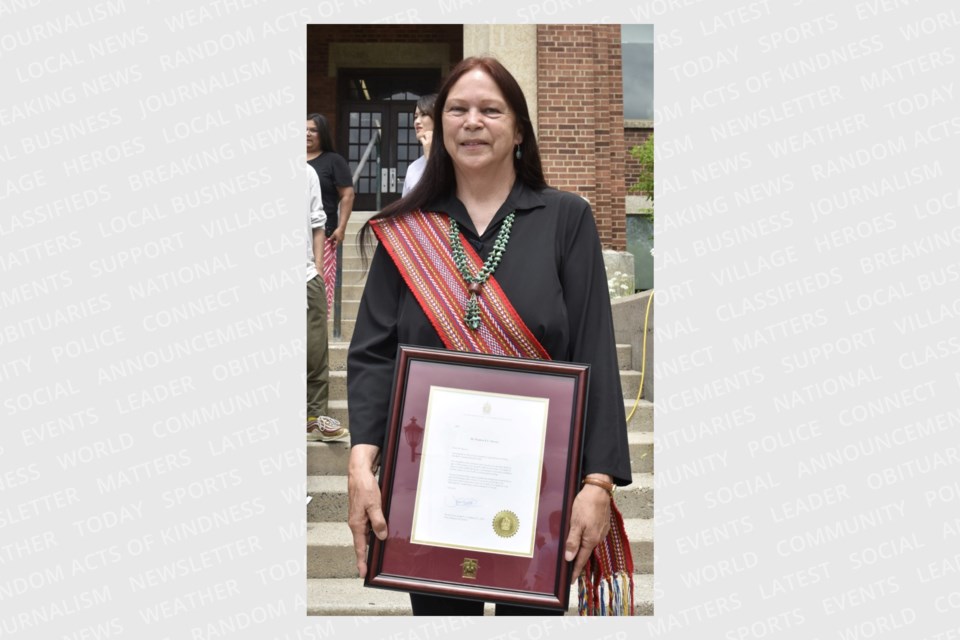Algoma University professor and researcher Dr. Paulette Steeves was taken aback last week when she received word that her book, The Indigenous Paleolithic of the Western Hemisphere, was selected as a 2022 Choice Outstanding Academic Title.
Affiliated with the American Library Association, Choice produces a select list of titles at the end of each year in order to highlight the best in scholarly works.
“I was emotional because I didn’t even know I was nominated,” said the Cree-Métis academic and author during an interview with SooToday Saturday. “So, it was really surprising but really great to be nominated because it’s a huge field. They look at thousands and thousands of books.
“It was a really big surprise for me.”
Published in 2021, The Indigenous Paleolithic of the Western Hemisphere is the result of a dozen years of research and mining evidence across a number of academic disciplines to make the case that Indigenous Peoples have been in the western hemisphere for more than 60,000 years — and likely more than 100,000 years.
Steeves recalls identifying 500 archaeological sites that predated Clovis sites — which showed evidence of human existence more than 10,000 years ago — within her first two weeks of conducting research.
“I went; this is way too many not to be something there. So I really started delving deeply into it, and I ended up with over 4,000 sites,” said Steeves. “I only included in the book ones that were academically published, so there’s a lot of other sites that are in reports.”
Steeves says archaeologists who researched pre-Clovis sites faced a “huge amount of criticism” for their work over the years, losing research funding and, in some instances, their jobs.
“It was a very, very taboo area — it was actually called an area of academic suicide, and that’s published data. So, I was really extremely careful with my book that everything was very well cited in publications,” she said.
Archaeology, Steeves explains candidly, has always been dominated by “settlers” with “eurocentric thought,” allowing racism and bias to fester within the community’s ranks.
“But the thought from the very beginning was to erase Indigenous people from the land, not to link them to the land — so that way, the archaeologists owned the power and authority over history. They owned the artifacts,” she said. “They didn’t ever listen or talk to Indigenous people about their own history, so they had the power and authority over creating that history.”
The standard in archaeology, Steeves adds, has been to dehumanize Indigenous people.
“Indigenous were not acknowledged for their knowledge, their intellect, their inventions, their government — for anything,” she said. “Now, we’re at a point where we’re still working to change those colonial discussions within academia, which also then influences the general population’s view of Indigenous people — and we’re getting there, but it’s just been a standard in colonial academies that you dehumanize Indigenous people.”
Steeves has been receiving thanks from academics and students alike for her book. But on the other hand, she says there's a “violent pushback” in the Americas against pre-Clovis sites, which was experienced by the author when some archaeologists from a university in the United States recently trolled Steeves on Twitter and called her work into question after her book received critical acclaim.
“I think moving forward, one of the ways we have to push back on racism and discrimination is through truth-telling,” Steeves said.
The Tier II Canada Research Chair in Healing and Reconciliation at Algoma University wanted The Indigenous Paleolithic of the Western Hemisphere to be a readable book that nearly anyone could pull off of the shelf and get into, and Steeves feels as though she has accomplished just that.
“That’s what I hear about my book too that makes me happy, is that it’s accessible,” said Steeves. “I told my publisher, I’m not just writing an academic book — I want a book that anybody can read, and so that’s what I really tried to do.”
